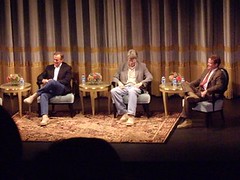 According to the Washington Post (bolding added for emphasis):
According to the Washington Post (bolding added for emphasis):
Grisham said Friday in an interview, "I am just shocked at the idea the Allen campaign would be this desperate. This is a clear sign of a desperate campaign if they plow through novels trying to find evidence of character. The old saying is 'everything is grist for the writer's mill.' Every person you see, every country you visit, every bizarre, vile, repulsive act could one day be in a novel. That is not reflective of your character as an author; it is reflective of what you witnessed as someone looking for material."Grisham then unloaded on Allen, saying, "It seems like voters should be more concerned with George Allen's fiction. I seriously doubt George Allen is much of a reader, but if he would read more, maybe he would understand the difference [between] fiction and non-fiction."
Now, everyone in Virginia who has ever read or written a book should write or call George Allen's campaign and tell them what they think. Tell them that George Allen's mentality - or lack thereof - is no different than others who have banned or burned books because they found the contents objectionable. George Allen is a disgrace to Virginia, to the United States of America, and to humanity. On November 7, thank God, we'll be rid of him forever. Just 11 more days...
Year 2006. People notice book for the first time. She now says it is a "novelization."
Year 2006. Brother George takes opponent's fictional work, tries to paint it as something Webb, what, thinks about? Fantasizes about? Approves of?
Except that this episode deals with sexual issues, remember when it came out that Allen used the n-word all the time, and Allen's aides said, hey Webb uses it in dialogue! I pointed out that Laura Bush, and many other people who actually read books, say Huck Finn is one of the great American novels -- yet it uses the n-word over 200 times.
Remember, this is the party whose leadership kept quiet about Foley, and now, it seems, Kolbe, for six years?
Funny... Yesterday, on another blog (Carpetbagger Report) a shill/troll tried to claim that Webb's a racist - "just see what he says in his books". I didn't remember Laura's accolade of Huck Finn, but I pulled out Twain all the same :)
A really good writer -- even of fiction -- is a "reporter" of sorts. He reports life as he sees/hears it. And the best ones report the sound so well, you forget it's only reportage; you become a part of the world they've created. The only difference between fiction and non-fiction is that, in fiction, a character is a "digested" composite; to fit well into the story he'll say something that several people may -- or even *might* -- have said in real life. That makes the characters more believeable (and the novel short enugh to keep you reading
Suppose you read a historical novel, about the French Revolution... One character is a haughty, clueless of reality aristocrat, who says "let them eat cake". Another character is a peasant, who, as a part of vicious mob raids and plunders his squire's castle, yelling "hang the bastards on a lantern!"
Two totally opposite attitudes are expressed... Would it be logical to assume that the author, who put those words into the mouths of his characters, is a... schizophrenic? Who *believes* one thing one minute and something entirely different the next?
If so, then every writer, from Aristophanes through Dante, through Shakespeare, through... to... All of them were raving lunatics... :)
Why is Allen winning the headline war on this book crap?
Remember the story about George slamming a pool cue into the head of Jennifer's boyfriend? (The act, of course, is morally offensive, but not the telling.) Here's what follows . . .
My mother welcomed Flynn into our family by serving him mounds of spaghetti. My brother George welcomed him by slamming a pool cue against his head. (p. 178)***I never told Dad about Flynn’s drinking. I did not tell Dad about Flynn driving drunk, and passing out, and waking to find that he had flipped his car on its side, wedged between a bulldozer and a tree. I did not tell Dad that when we went to parties, Flynn usually passed out. Sometimes, I would find him in the shrubbery; other times, flat-out on the grass. His drinking never failed to put him to sleep. He slept through my first fully dressed, body-to-body, nonpenetrating orgasm. (p. 179)
Here's a coming of age story that is not out of the ordinary:
In PE, I was the last chosen for sides . . . I wouldn’t choose me either. I stood around with my arms close to my chest, unable even to talk anymore, my tongue too tied from smoking grass.” Pp. 215-16
Here's another example of context. There’s a funny description of a letter Frank Sinatra sent to Coach Allen when he was fired by the Rams. Jennifer describes how the family laughed and laughed at the letter, which read in part . . .
“I wish I could be with you . . . but I had a previous commitment with the Rams cheerleaders. While the Friars are giving you something to cheer about tonight, I am giving the Rams cheerleaders something to cheer about . . . one at a time.” Pp. 220.
Out of context, it reads like a sordid gangbang. In context, it's an unshocking tale of ribald humor that even the straight laced George Allen laughed hard at.